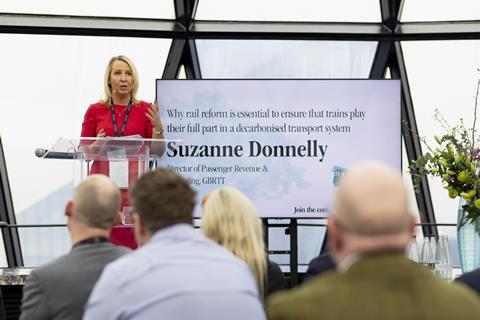
UK: The government is planning to announce details of plans for national rail ticket reform by May, Rail Business UK understands.
The passenger rail industry’s desire for reform was highlighted at an event held by ticket retailer Trainline in London on February 21.
Rail Minister Huw Merriman said ticketing is a top concern for passengers, who ‘expect dynamic digital-first experiences; they want easier ways to pay, they want a simpler structure, fairer ticket pricing and smarter pay-as-you-go ticketing’.
Merriman said ‘companies like Trainline provide an invaluable service, make it as simple as possible to find the best fare and the right time within the current structures’. He is committed to retaining independent ticket retailers when Great British Railways is in place, and to providing a level playing field ‘so new entrants and established players can deliver’.
Champa Magesh, President of Trainline’s b2b arm Trainline Partner Solutions, said ‘retailing isn’t a competition, it is a solution to growing rail’. She asked why Delay Repay is not currently available to independent retailers. ‘Invite them into this conversation, they can relieve those costs from the industry’, she added.
Suzanne Donnelly, Director of Passenger Revenue & Marketing at the Great British Railways Transition Team, said rail had not kept place with apps and changes to the way people live and work, and it ‘needs to be become less insular as an industry’.
She said analysis has found that 80% of passengers use 5% of ticket types. Campaigns by individual train operators to highlight fares which are competitive with flying had succeeded in driving modal shift. ‘Imagine if we did this systematically across the industry.’
GBRTT has worked with operators’ body the Rail Delivery Group to look at opportunities to work more closely with the corporate and business travel sector, including travel management companies.
A ‘green travel pledge’ is to be launched this summer, providing business with data on the benefits of rail which can be incorporated into corporate sustainable policies and act as a ‘nudge’ towards changing behaviour.
Magesh said ‘major employers have targets for 2030, just seven years away. We need a sense of urgency on marginal gains; we must build awareness, consideration and conversion of travellers to rail.’
Asked by Rail Business UK how GBRTT will balance the inevitable winners and losers from ticketing reform and public cynicism about the process, Donnelly said there is ‘loud and clear’ government support for reform, and while the single leg fare trials at LNER have both winners and losers, ‘the ‘anticipated noise’ for the people negatively affected was not as loud as predicted. She said there is no model of reform ‘where everyone wins’, but it is time for the sector ‘to take a bold risk’ and make changes.
Andy Bagnall, CEO of the Rail Partners Association which represents train operator owning groups said a third of people are put off rail by the complexity of ticketing, and ‘fares reform is something passengers will see every time they interact with the railway’.
The need for access to better rail industry data was highlighted by Chacasta Pritlove, Head of Transport at Google Cloud, who said this would enable rail travel options to be put in front of potential passengers and provide a better understanding of who is not travelling by rail and why. At the moment ‘trust is missing’ she said. ‘We need the data.’
Real prices paid
Trainline has produced an analysis of how much its customers paid on popular routes in 2022, comparing the price charged for a walk-up ticket with the average price actually paid when taking into account Advance tickers, railcards and use of its SplitSave tool.
| Origin | Destination | Peak or Off-peak | Walk-up single price | Average price paid | Saving(£) | Saving(%) |
|---|---|---|---|---|---|---|
|
Glasgow |
Leeds |
Off-peak |
£120 |
£36·97 |
£83·03 |
69% |
|
Leeds |
Nottingham |
Peak |
£52·90 |
£17·17 |
£35·73 |
68% |
|
Newcastle |
Edinburgh |
Peak |
£65 |
£21·56 |
£43·44 |
67% |
|
Manchester |
Nottingham |
Peak |
£49·60 |
£20·61 |
£28·99 |
58% |
|
Cardiff |
Leeds |
Peak |
£151·40 |
£62·88 |
£88·52 |
58% |
|
Bristol |
Manchester |
Peak |
£105·50 |
£48·04 |
£57·46 |
54% |
|
Birmingham |
Bristol |
Peak |
£66·60 |
£30·80 |
£35·80 |
54% |
|
London |
Newcastle |
Peak |
£175 |
£85·70 |
£89·30 |
51% |



